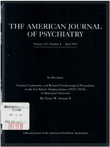A randomized double-blind study of fluoxetine versus placebo in the treatment of dysthymia
Abstract
OBJECTIVE: The purpose of this study was to assess the efficacy of fluoxetine, a selective serotonergic antidepressant, in the treatment of dysthymia. METHOD: Thirty-five patients who met criteria for dysthymia, but not major depression, began randomized, double-blind 8- week trials of fluoxetine or placebo. RESULTS: Of 32 patients who completed the study, 10 (62.5%) of the 16 patients given fluoxetine and three (18.8%) of the 16 given placebo responded to treatment. Response was defined as 1) 50% or greater decrease in Hamilton Rating Scale for Depression score and 2) a score of 1 or 2 on the Clinical Global Impression (CGI) improvement subscale. Fluoxetine subjects showed significantly greater improvement at week 8 than placebo subjects on the Hamilton depression and CGI scales, but not on the Hopkins Symptom Check-list (58-item) or the Cornell Dysthymia Rating Scale. CONCLUSIONS: When compared to placebo, fluoxetine showed short-term effectiveness in treating dysthymic symptoms.
Access content
To read the fulltext, please use one of the options below to sign in or purchase access.- Personal login
- Institutional Login
- Sign in via OpenAthens
- Register for access
-
Please login/register if you wish to pair your device and check access availability.
Not a subscriber?
PsychiatryOnline subscription options offer access to the DSM-5 library, books, journals, CME, and patient resources. This all-in-one virtual library provides psychiatrists and mental health professionals with key resources for diagnosis, treatment, research, and professional development.
Need more help? PsychiatryOnline Customer Service may be reached by emailing [email protected] or by calling 800-368-5777 (in the U.S.) or 703-907-7322 (outside the U.S.).



